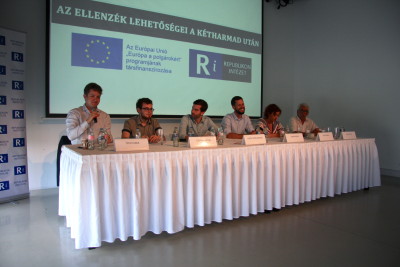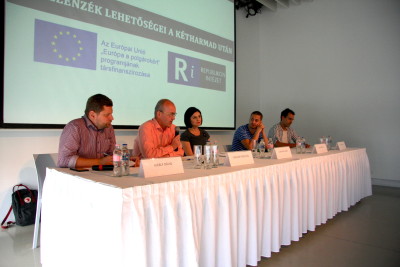In June 2018, Republikon Institute organized a conference on the topic “The Scope and Possibilities of the Hungarian Opposition Following Orbán’s 2/3 Majority Win”, during which political analysts, activists, and representatives of Hungarian opposition parties discussed what to expect after the April elections, exchanged views on possible changes in the Hungarian political sphere and on how much room for maneuver the opposition will from now on have left.
On the morning of the Hungarian parliamentary elections in April this year, hopes of the opposition parties were high to defeat the Fidesz, which has been governing the country since 2010. The hopes only grew with the news of an exceptionally high voter turnout, but were shattered the same night, when it became clear that the coalition is not only keeping its majority but succeeded to secure 2/3 of the seats in the parliament, which equipped it with the right to amend the constitution. The devastating defeat and the change of the political ball game asks for the opposition to rethink is way of doing politics going forward.
Consequently, on June 19, Republikon Institute organized a conference on the topic, with the aim to kickstart a broader political discussion. Political analysts, activists, and representatives of Hungarian opposition parties discussed what to expect after the elections, exchanged views on possible changes in the Hungarian political sphere, and on how much room for maneuver the opposition will from now on have left.
The conference was dominated by two topics. On the one hand, the question whether Orban’s regime could have been defeated, if the opposition parties agreed on single candidates to prevent the division of votes in a simple majority contest. This being a prevalent debate in Hungarian society for years now, as Fidesz has taken advantage of its 2/3 majority, changing the election law in 2011, undoubtedly favoring the government parties in single-member district votes.
On the other hand, a debate focused also on a possible parliamentary boycott by the opposition, which would serve a symbolic purpose, aiming to draw attention to the dismantling of democratic institutions, the rule of law, and the total exclusion of the opposition in the legislation process.
The first panel discussion was opened by László Majtényi, a law professor and a former nominee for President of the Republic of Hungary. Majtényi started his speech by putting into perspective, that although the campaign and elections were not set on a level playing field, the opposition has to take some responsibility for the election results.
It was not the inability to coordinate candidates in the districts that is to blame, rather the conflict generated by it, which dominated public discourse and hindered the opposition form running a meaningful campaign. Furthermore, he elaborated that a parliamentary boycott should not be considered, as members of the parliament still have some means left to enact control over the government.
Krisztián Ungváry, a historian, advocated in favor of a boycott, stating that taking part in a, what he called, “simulation of a parliament” focuses n the issue of whether taking up a mandate does not actually help to legitimize the means of the government.
Ágnes Kunhalmi, of Hungarian Socialist Party (MSZP) MP, on the other hand, would consider a parliamentary boycott if all the other opposition parties would have decided on doing the same. She did, however, emphasize that as an MP she receives considerable financial means, which could be put to good use in oppositional politics.
Kunhalmi sees her work as an oppositional politician in building-up cooperation between political powers of the left, similarly to how Orbán and Fidesz have done it on the political right.
Péter Ungár, an MP of a small opposition green party, LMP, rejected the idea of a boycott, since from his point of view the elections in April are not going to be fair. He contested the proposal of Kunhalmi saying that a merger between left wing political parties might turn out to be unsuccessful. Oppositional parties should rather focus on the “content” of oppositional politics.
Balázs Böcskei, an analyst of the IDEA Institute, explained that regulations regarding parliamentary work are not discriminative of opposition parties and, therefore, the decision to boycott it would result in a discrepancy. He also noted that politicians and parties are not actively engaging in putting forward political issues. Political discourse led by the media and negative press on the conflicts between and within the parties discourage voters.
During the second panel discussion, the panellists debated whether there is a need for a new opposition, in order to oust Orbán and his party from the government.
András Fekete-Győr, the party leader of Momentum Movement formed only last year, stated that it was unrealistic to expect an opposition, which was unable to force the regime out of power four years ago, to do better this time around.
Viktor Gyetvai, an activist of the Independent Student Parliament, urged politicians who have lost their creditability to take step back and consider whether their presence in politics actually helps the cause of the opposition or impedes it.
Bence Tordai, a Parbeszéd MP, on the other hand, responded Mr Fekete-Győr by saying that in the past few years many new parties and political actors appeared on the Hungarian political scene with the aim of enticing a change, but most of them are by now considered to be a part of the “old opposition”.
Similarly, Ágnes Vadai, a DK MP, noted that it is very difficult to step-up to the hate-filled rhetoric of the government and that new parties may not necessarily be the solution to the problem.
An independent candidate running in a Budapest municipal by-election (endorsed by the opposition parties), Péter Győri, agreed with Gyetvai and emphasized that most citizens as of now could neither choose, nor are willing to vote for one of the oppositional parties. From his point of view, it would be probably best to bring new people into politics.
Conclusions
The only thing the panellists may have agreed on was the need to oust Viktor Orbán from the government, but amidst a political system that requires the opposition to cooperate very closely, the municipal elections next year do not seem like something to look forward to.
Nevertheless, there is hope: Opposition parties may have by now realized that blaming and pointing the fonger at one another from the afar is not what voters want. What they do want is an opposition that stands up for citizens, takes initiative, and comes up with real solutions to real problems. The following months will hopefully put these common aims and goals into perspective.



![The Scope and Possibilities of the Hungarian Opposition Following Orbán’s 2/3 Majority Win [Conference Report] The Scope and Possibilities of the Hungarian Opposition Following Orbán’s 2/3 Majority Win [Conference Report]](http://4liberty.eu/phidroav/2018/07/IMG_1315_main-photo-1024x683.jpg)

